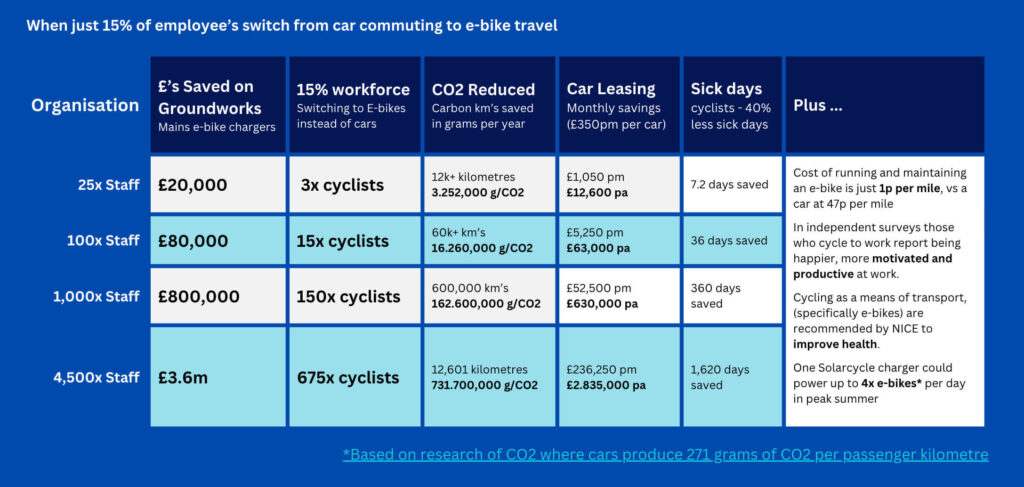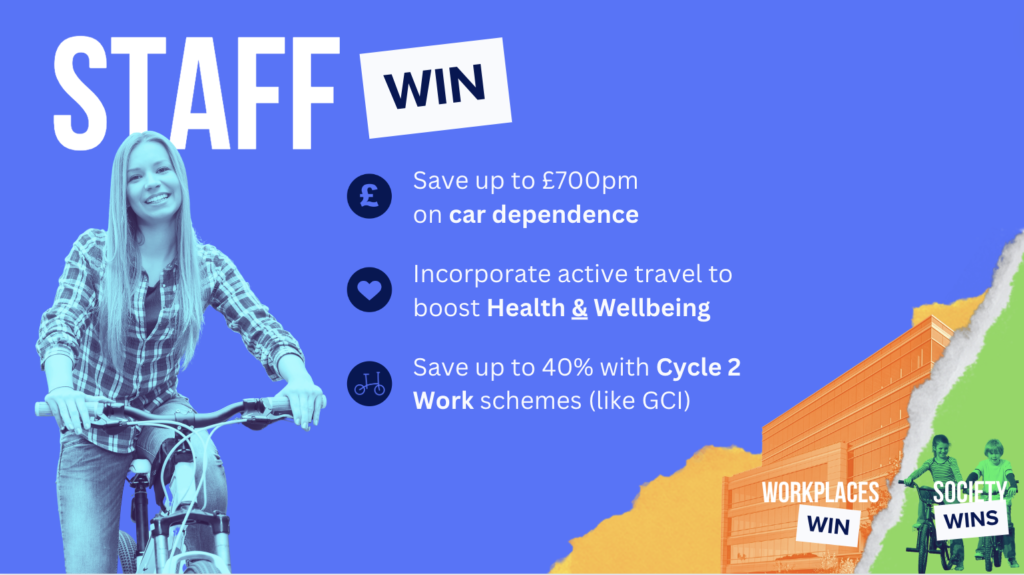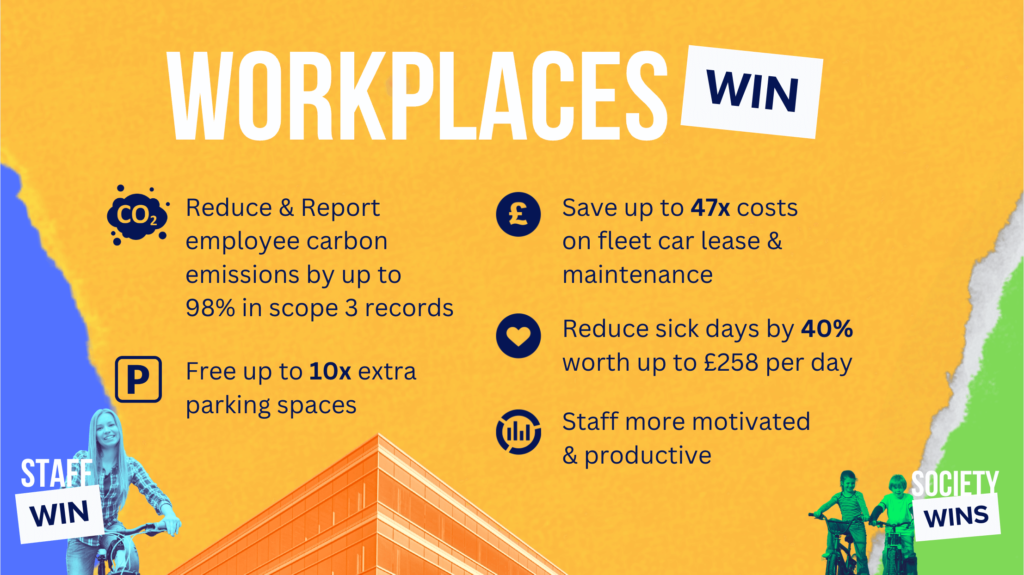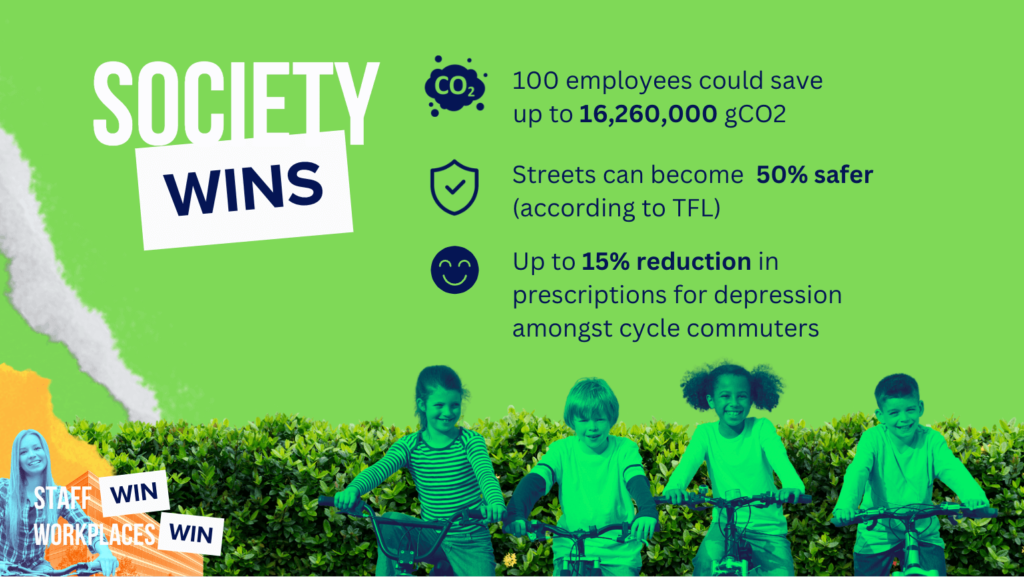
How Organisations Win with Active Travel
How organisations are Winning with Active Travel
At a time where sustainability and staff wellbeing are a priority for businesses and organisations, the concept of “active travel” has gained significant traction.
Active travel refers to any form of human-powered transportation, such as walking, cycling, or scooting, that promotes physical activity while reducing carbon emissions. In essence, active travel is about getting you moving from A to B with less fossil fuels.
E-bikes arguably stand out as the most compelling active travel choice, offering a perfect blend of efficiency, accessibility, and eco-friendliness. Encouraging staff to switch from cars to e-bikes can be a game-changer, not only for employees’ well-being but also for the environment and the bottom line. Most journeys people make using cars are under 5 miles, so there’s real potential to swap the car for an e-bike.
Organisations bear significant responsibility in decarbonising our economy and achieving our net zero targets. With transport standing as the UK’s largest single source of emissions, a critical aspect involves rethinking how we travel. Whether for commuting or other business trips, embracing active travel with e-bikes can notably aid in emissions reduction.
Understanding the Benefits of Active Travel
Cost Savings
The average cost of maintaining car is around £319 per month in the UK, plus an average price of between £100 and £1000 for leasing/purchasing a car. From fuel costs to parking fees and congestion charges, commuting by car can be a significant financial burden for both employees and employers. In contrast, the ongoing costs associated with e-bikes, such as electricity for charging and periodic maintenance, are just 1p per mile. Moreover, initiatives such as the Cycle to Work scheme provide tax incentives and cost-effective financing options for employers looking to facilitate e-bike adoption among their staff. For example, the lease or purchase cost of an e-bike, compared to a car, is as low as £67 per month through someone like the “Green Commute Initiative“.
Other cost benefits include the well-being impact of active travel with increased productivity and reduced number of sick days. Absenteeism costs employers £258 per day and the average worker takes 4.5 days off a year, compared to 2.4 days for people who cycle. Regular exercise, even in the form of commuting, has been linked to reduced stress levels and better overall health. Encouraging employees to embrace active travel, particularly through e-bikes, can significantly improve their physical and mental well-being.
Meet CO2 Objectives
Commuting alone contributes to 98% of an individual’s work-related carbon footprint. As many as three million commuters travel as little as two kilometres to work, making an uptick in active travel one of the most actionable ways to drive down corporate emissions.
Businesses dedicated to creating sustainability reports can now easily prioritise assisting employees in switching to e-biking. This becomes particularly crucial with Scope 3 Contractual Emissions Reporting, which encompasses employee commuting, significantly influencing companies’ bids for new work.
E-bikes, when charged with Solarcycle, are the zero-emission mode of transport, emitting no greenhouse gases during operation. Solarcycle stands out in the market with its unique Reporting Function, which tracks the free-to-use, 100% renewable solar energy discharged in kWh. This feature empowers organisations to monitor their progress towards sustainability goals and accurately measure their carbon impact. As the sole off-grid solar e-bike charging system with this capability, Solarcycle stands out as the premier product in the market.

Active Travel in Numbers
We have set out some of the key benefits of adopting active travel with Solarcycle into the organisation. This is to demonstrate the significant impact that can be achieved when just 15% of employees switch from the car to an e-bike and charging with Solarcycle. Here are some highlights:
Those who cycle take 40% fewer sick days, resulting in saving an organisation with 25 employees 7.2 sick days per annum, 36 days for an organisation with 100 employees, a staggering 360 days for an organisation with 1,000 employees, and 1,620 days for an organisation with 4,500 employees – an absenteeism saving of £417,960.
Solarcycle eliminates the need for expensive groundworks, which can account for up to 60% of grid-connected EV charge station installation costs. Based on the typical cost of installing mains e-bike chargers for our customers, the saving with Solarcycle for an organisation with 25 staff and 3 e-bikes will be £20,000, rising to an incredible 3,6m for organisations with 4,500 staff and powering 75 e-bikes.
Most notable are the annual CO2 savings from carbonless commuting with active e-bike travel and Solarcycle charging. An organisation with 25 employees and 15% e-biking will save 3.252,000g of CO2, this rises to 16.260,000 g of CO2 for an organisation with 100 employees, and a staggering 731.700,000 g of CO2 for an organisation with 4,500 employees.
Promoting e-bike commuting as a form of active travel presents a win-win solution for businesses, employees, and the environment. By embracing this sustainable and health-conscious transportation option, companies can foster a culture of well-being, significantly reduce their carbon footprint, and reap the financial benefits of a more cost-effective and efficient mode of commuting.
Solarcycle offers businesses an impactful proposition with its cost-effective, sustainable solution for reducing carbon footprints through active travel adoption. With no ongoing energy costs, minimal installation expenses, and both financial and environmental benefits, Solarcycle stands out as a smart choice. Access Solarcycle’s ‘Business Case Kit’ to effectively advocate for solar-powered e-bike charging within your organisation. Download your kit now and let’s join forces to create a greener, healthier, and more sustainable world.
Planning an E-bike Scheme?
Use our Business Case Kit packed with the latest facts and tools to help you build an internal brief or apply for funding.


